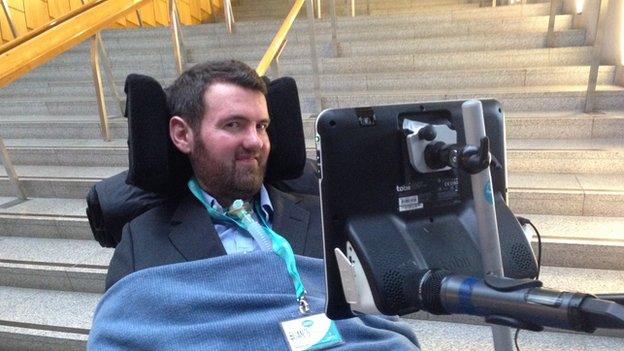Doddie fund raises £250k for MND research
- Published

George "Doddie" Weir revealed last year that he had motor neurone disease
A foundation set up by former rugby star Doddie Weir has raised £250,000 for research into motor neurone disease (MND).
The money will allow scientists in Edinburgh to study whether drugs already used to treat other conditions could help people with the disease.
The former Scotland international announced last year that he had MND.
He launched the My Name'5 Doddie Foundation with the aim of finding a cure for the terminal condition.
Own voice
The name of the foundation is a reference to his rugby shirt number.
He said: "This is our second significant investment in research and we are delighted to be working with the respected Euan MacDonald Centre at the University of Edinburgh."
Euan MacDonald is a Scottish entrepreneur who was diagnosed with MND in 2003. He has helped establish a voicebank for people with disabilities wanting to preserve their own voices, and produced a disabled access guide for Edinburgh.

Euan MacDonald has been awarded an MBE for his work to help those with motor neurone disease
Doddie added: "Euan and his family have done a great deal in the fight against this devastating disease and we hope that by pledging funds to this new initiative, we can help make a difference.
"This commitment has only been possible through the incredible help and fund raising efforts of the fine people who have supported us over the past 10 months.
"The response to my diagnosis and the launch of the foundation has been inspiring and we will continue to do all we can to help find a cure."
Motor neurone disease (MND), also known as ALS, is a progressive and terminal disease that damages the function of nerves and muscles, resulting in severe damage to the brain and spinal cord.
It affects up to 5,000 adults in the UK at any one time. There are no treatments.
The team at the Euan MacDonald Centre for MND Research will take samples of blood cells from people with the condition and convert them into brain cells in the laboratory.
Brain cells
These will have all the characteristics of the patients' own brain cells, including signs of their condition.
Scientists will then use advanced automated laboratory drug testing technology, developed at the University of Edinburgh, to screen scores of existing medicines on the cells.
They hope to identify drugs that might have beneficial effects on MND symptoms and prioritise those that could be fast-tracked for clinical trials.
Prof Siddharthan Chandran, director of the centre, said: "We're specifically investigating drugs that are already licensed as treatments for other diseases.
"If we find something that looks promising, it can be taken into clinical trials far more quickly than an unlicensed drug.
"As well as testing individual medications, we're looking at combination therapies as we've learned from cancer research that these are often more effective for fighting complex diseases such as MND."